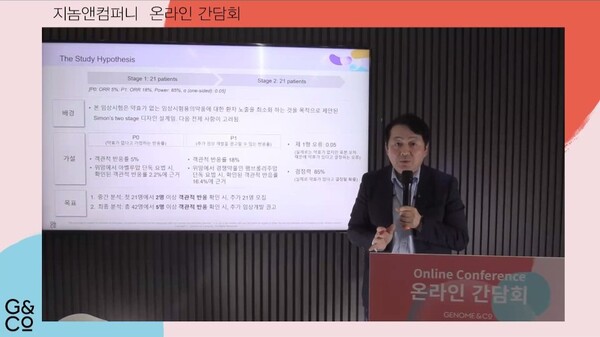
Genome & Company has declared its strategic move to penetrate the third-line treatment market for gastric cancer through the development of a microbiome-based immunotherapy.
At an online news conference Friday, Genome & Company unveiled the phase 2 clinical trial results of its candidate, GEN-001, for gastric cancer. GEN-001 is a microbiome-based oral therapy based on a single strain of lactococcus lactis.
On Thursday (local time), Genome & Company presented a poster on GEN-001 phase 2 cutoff data at the American Society of Clinical Oncology (ASCO) Gastrointestinal (GI) Cancers Symposium in San Francisco, Calif. It was the first presentation of detailed topline data from the phase 2 trial, following the phase 2 interim analysis results in May last year.
The phase 2 study included 42 patients with PD-L1-positive advanced gastric or gastroesophageal junction cancer who had failed two or more standard therapies, regardless of prior immunotherapy. It compared the combination of GEN-001 and Merck’s Bavencio (avelumab) to the Bavencio monotherapy.
Clinical results showed seven partial responses (PRs), most notably in three of eight patients (objective response rate of 37.5 percent) who had received and failed prior immunotherapy. Median progression-free survival (mPFS) estimated by Kaplan-Meier analysis was 1.7 months and median overall survival (mOS) was 7.9 months.
"It exceeded our primary phase 2 objective of comparing the response rate of avelumab monotherapy to the competing drug, MSD’s Keytruda (pembrolizumab) monotherapy,” CEO Bae Ji-soo, a psychiatrist, said. “The data demonstrated meaningful therapeutic benefit and prolonged survival, raising the possibility of developing a third-line treatment for gastric cancer, a disease with significant unmet need."
Commenting on the recent emergence of the antibody-drug conjugate (ADC) drug Enhertu (trastuzumab deruxtecan) of Daiichi Sankyo and AstraZeneca as a competitor in the third-line treatment of gastric cancer, CEO Bae said, "The HER2-positive patients targeted by Enhertu represent only 20 percent of the total patients. We also will continue our biomarker research and development."

